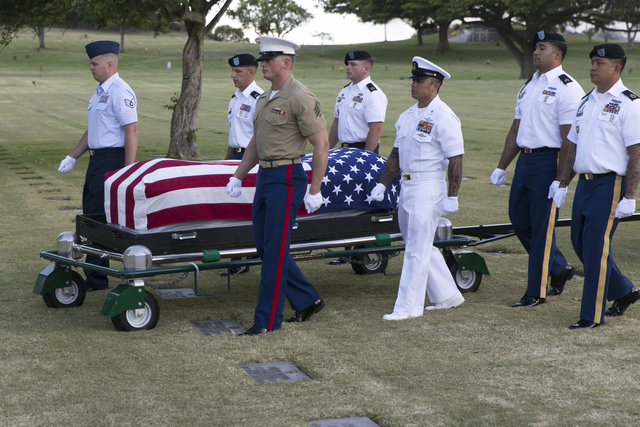HONOLULU — The military on Monday exhumed more caskets containing the unidentified remains of USS Oklahoma crew members killed in the 1941 bombing of Pearl Harbor. ADVERTISING HONOLULU — The military on Monday exhumed more caskets containing the unidentified remains
HONOLULU — The military on Monday exhumed more caskets containing the unidentified remains of USS Oklahoma crew members killed in the 1941 bombing of Pearl Harbor.
The Defense POW/MIA Accounting Agency disinterred five coffins from four grave sites at the National Memorial Cemetery of the Pacific in Honolulu, where they have rested for decades. The work is part of an effort announced in April to account for up to 388 Oklahoma sailors and Marines still classified as missing.
The cemetery and the military allowed media to observe a ceremony afterward during which flags were draped over the coffins. An honor guard and cemetery staff transported the coffins to trucks that carried the remains to a laboratory at Joint Base Pearl Harbor-Hickam.
Michael Linnington, a retired Army lieutenant general who currently leads the Defense POW/MIA Accounting Agency, told reporters the lab in Hawaii will identify some remains using dental records. The remains will then be sent to another lab in Omaha for DNA analysis.
He said family members of those missing are eager to have their fathers, grandfathers and uncles identified.
“They want their loved ones home, and we’re happy to help them in that process,” Linnington said.
The Oklahoma identification project involves disinterring 61 caskets at 45 grave sites at the Honolulu cemetery commonly known as Punchbowl. About 15 caskets have been exhumed.
The Oklahoma capsized after being hit by torpedoes during the Dec. 7, 1941, Japanese attack. Altogether, 429 sailors and Marines on board were killed. Only 35 were identified in the years immediately after.
Hundreds were buried as unknowns at cemeteries in Hawaii. In 1950, they were reburied as unknowns at Punchbowl.
The military is acting now, more than 70 years after the men died, because advances in forensic science and technology as well as genealogical help from family members have made it possible to identify more remains.
The agency expects to identify about 80 percent of Oklahoma crew members now considered missing. It expects the work will take about five years.
Some of analysis will conducted at the Armed Forces DNA Identification Laboratory at Dover Air Force Base in Delaware.







